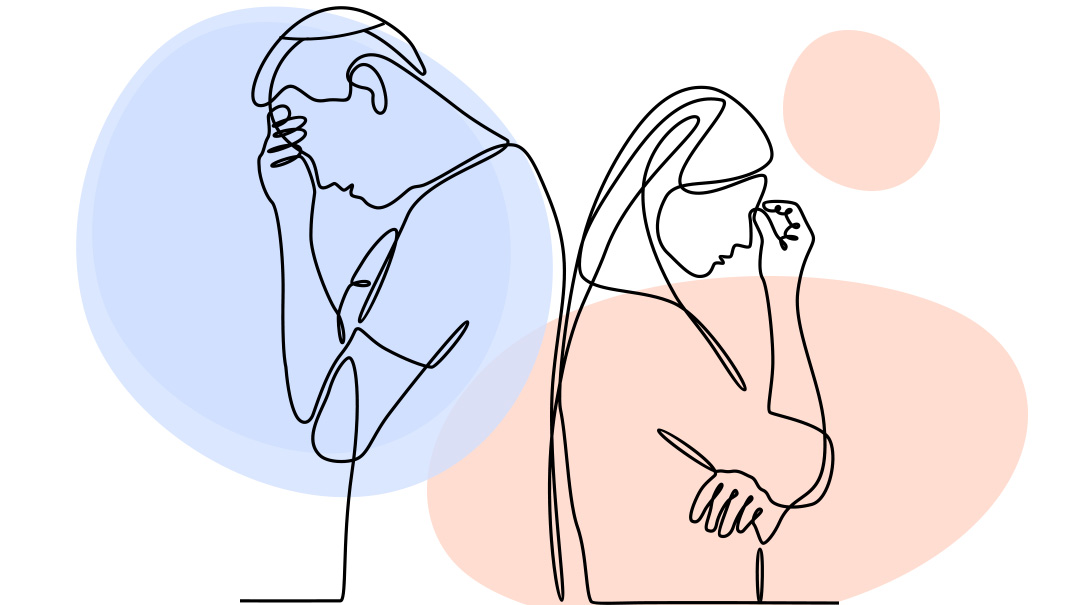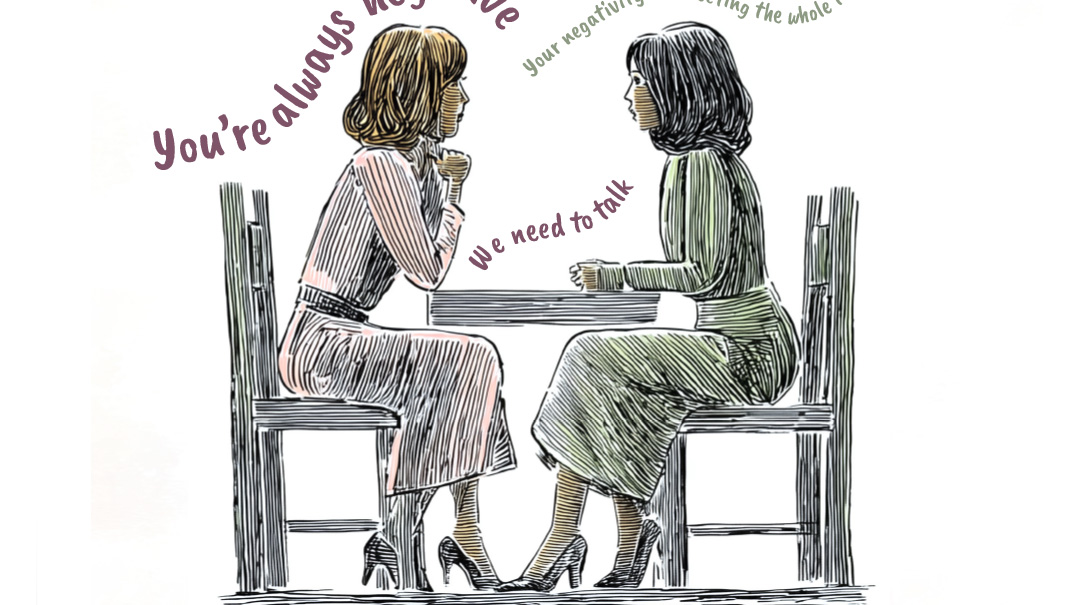It’s Not All Abuse
| July 26, 2022It’s very troubling when the terms abuse or abusive are thrown around about all sorts of problems, without nuance, and often without accuracy

“My husband is totally abusive.”
“I’m worried about my brother. I think something is really wrong with my sister-in-law. She’s so abusive to him.”
“That is not a healthy relationship — I think it’s abusive.”
I remember when, as a community, we wouldn’t acknowledge the existence of abuse. When Shalom Task Force couldn’t get Jewish publications to run a paid advertisement for their domestic violence hotline. It should be gratifying, the fact that people are able to talk about abuse so freely. Actually though, it’s very troubling when the terms abuse or abusive are thrown around about all sorts of problems, without nuance, and often without accuracy.
The reality is that when everything is abuse, it dilutes focus, resources, and commitment from addressing the problem of actual domestic violence. Moreover, if we’re unclear or lack nuance in our understanding of what, specifically, is going wrong when a marriage is troubled and someone is unhappy, we can’t suggest the appropriate intervention to address that unhappiness, whatever it does or doesn’t include.
In some cases, people will describe horrifying abuse in ways that minimize it, or they’ll take the blame for “causing” it, not understanding that the responsibility for abusive behavior lies squarely with the abuser. Then there are those who easily throw around the term abuse or abusive, when, in fact, they’re struggling with poor communication and conflict management, which a couple will need to work on together. Or perhaps there’s a mental health problem that needs a different type of intervention altogether.
Although there may be struggles, marriage should be a place where you feel care, concern, safety, attachment, and belonging. If someone is distressed, unhappy, miserable, or feeling abused in their marriage, they should reach out for help. The key is to then discern what’s underlying that unhappiness, so the couple and whoever is guiding them, if there is someone, can know what type of help to recommend.
This clarity is crucial for the couple to receive appropriate treatment. Appropriate so the suggestion doesn’t compromise safety, if there is actual abuse. Appropriate so an unhappy individual or couple can get the right kind of help sooner rather than later, and optimally without wasting time trying approaches that don’t work because they aren’t the best fit for what’s truly going wrong.
In my 30-plus years of psychotherapy practice, I’ve had countless individuals tell me, “I’m here because I’m unhappy in my marriage.” To try to get clarity about appropriate treatment options, I’d like to define a healthy/functional marriage, a dysfunctional marriage, and domestic abuse, and see how “unhappy” can happen in all three marriages, and give some general direction for each.
The Healthy Marriage Core Principle
A healthy marriage is one in which each spouse feels responsible, and sees it as his or her tafkid, to act in consideration of, and with care toward, the needs, feelings, opinions, and perspectives of the other —emotionally, spiritually, physically, and psychologically. When this dynamic is present between spouses, it creates the underpinning for a deeply fulfilling and healthy marriage. We can refer to this as a healthy or functional marriage, because each spouse is functioning as they are supposed to. Each is getting their needs met, but from a giving position.
Sometimes, people hear this and misunderstand what’s required of them in this type of marriage. They think it means that they must stay quiet, not expressing their needs, opinions, feelings, or perspectives, because they’re supposed to be focused on giving to their spouse. But how can you give to your spouse, and how is your spouse supposed to consider you, if you don’t each express what you need, feel, and believe?
Expressing yourself and your needs in your marriage is a necessary step in creating a healthy, functional marriage. Each of you having the desire to care for the other doesn’t magically create the knowledge needed of how to provide those things. Only by communicating your needs, and your spouse communicating their’s, can each of you try to prioritize those needs.
What’s important to note is that even when both people have the right attitude and goal regarding marriage, one or the other spouse might find that they are unhappy. This can happen because they both want to give but their needs are at odds, and they don’t know how to navigate that. It may happen because the right intention is there but the communication skills aren’t, so the spouses don’t know how to express themselves or to listen to the other.
This happens most commonly when a husband and wife want very different things in a similar situation. In that case, one or the other does express what they want, but their spouse doesn’t “believe” it because it seems too foreign or doesn’t make sense to them. They don’t mean to be inconsiderate; they just don’t think their spouse could really want what they say they want. Other times, trouble arises because one or both spouses act out of misunderstood or inaccurate assumptions, leading to disappointment, anger, and frustration.
If needs are at odds; spouses are unsure how to handle unmet expectations; a couple doesn’t know how to manage conflicts; or they aren’t really hearing each other, even spouses with the attitude necessary for a healthy, functional marriage can still experience a lot of distress.
When someone feels unhappy, unheard, unattended to, they may experience that as being mistreated, that there’s something wrong with their spouse, or that their spouse is “abusive.” In fact, there may be a very functional core to their relationship, and what they actually need is help getting from a healthy attitude to healthy interactions. This can mean marriage education or some marriage counseling, depending on how much difficulty their issues are causing.
Unhealthy/Dysfunctional Marriage Core Principle
In the dysfunctional marriage one spouse or both spouses are not focusing on giving, but rather on themselves. Even when one spouse is functioning from the proper perspective, we’d still call the marriage dysfunctional, because a marriage is considered functional when both spouses prioritize giving to the other.
This dysfunction of self-focus in a marriage may occur for a variety of reasons. Sometimes the cause is a basic lack of education regarding the correct role of a spouse. The person (either generally or specifically in marriage), thinks in terms of what they’ll get, and not what they’re going to give. This attitude, when coupled with someone else with the same attitude, will yield a lot of tugging back and forth, each trying to get their own way. This attitude, when coupled with someone who is trying to give, might feel fine to the taker, but will feel overwhelming, depleting, and distressing to the one trying to give, only to be met with an expectation to give more.
The other sub-category of dysfunctional marriage is when one of the spouses has a serious mental illness — such as an addiction, mood or personality disorder, etc. — that makes it difficult for them to be attentive to someone else, except possibly to get their own needs met. They may have the right attitude about marriage, but practically speaking, their illness gets in the way of their ability to consider the needs of their spouse.
This is not to say that someone with a mental illness cannot be a good spouse. They can. We would only refer to this as a dysfunctional marriage if the mental illness was severe enough and actually getting in the way of proper functioning as a healthy spouse, in significant ways.
Many people come in for counseling feeling anywhere from unhappy to abused as a result of being in one of these marriages. The key is to see the core dynamic for what it is, and get help that’s appropriate for the situation.
Domestic Abuse
Domestic abuse, currently referred to in the field as Intimate Partner Violence, has been defined as a pattern of coercive control that one person exercises over another in order to dominate and get their way. It also includes behaviors that physically harm, and/or arouse fear, in an effort to prevent a person from doing what they want, or to compel them to behave in ways they do not freely choose.
To get to the heart of the difference, in contrast to a dysfunctional marriage where at least one spouse isn’t giving because they’re primarily focused on themselves and their own needs, in cases of domestic abuse, the abuser is focused on their spouse — but in order to dominate and control them. The core dynamic in cases of domestic abuse is the abuser’s belief in their entitlement to gain and maintain control over their spouse; that is the focus.
The highly dysfunctional marriage can often be confused with cases of domestic abuse. The abuser expects to dominate by having the marriage revolve around their needs, their opinions, their perspective, but the dysfunctional spouse can sound that way, too, because of their self-centeredness. At its core, dysfunction is when someone is focusing inward on themselves and their needs, ignoring the needs of the other person. Domestic abuse is when the focus is outward on dominating and controlling the other person.
Domestic abuse comes along with fear. This fear is based on the knowledge that the abuser will continue to escalate the control tactics until the abused spouse feels it is no longer worthwhile to assert their differences,opinions, or needs because the consequences are too grave. The abused spouse often fears for their own safety or well-being of the children, if they should try and challenge the control of the abuser. Making the situation even more unbearable is the fact that trying to get help from an outside source can feel too frightening because of the consequences the abuser imposes to maintain control.
In a dysfunctional marriage, there’s a lot of pain, hurt, and maybe even worry about asserting one’s needs, opinions, or perspective. When the healthy spouse in that kind of marriage comes into therapy they can sound very much like an abused spouse. Ultimately, however, when the spouse of someone dysfunctional stands up to him/her, they can. It’s an unpleasant experience, because it’s not how they want to function as a caring, giving spouse — but it’s not dangerous, in the way it is in cases of domestic abuse. Unfortunately, sometimes it’s only the experience of trying to assert oneself and seeing the consequences that gives a clear picture as to what the core dynamic is.
This is an extremely important distinction, but figuring it out while being mindful of safety is crucial. In the case of dysfunction, couple’s counseling, or individual counseling to address the mental illness, and other similar approaches may be the intervention of choice. These can have a profound impact on a marriage. But some of those same interventions, in the case of domestic abuse, could be anywhere from useless to unsafe.
If you’re feeling unhappy in your marriage, I hope this has helped you start to shape your thoughts and encourages you to go for help. While volumes have been written about each of these three types of marriages, understanding the core dynamic of each can direct your next steps. If you want to reach out, there are referral agencies you can talk to, which can help you get the best kind of assistance. Because everyone deserves to be in a happy marriage.
Know Your Reality
To maximize the benefit of a referral, be prepared, so you have the best chance of being pointed in the right direction. Think about the following and present this when you reach out:
How long have you been married?
When did you start feeling worried or unhappy?
What specifically was going on at that time?
What has been going on since then?
Has there been a progression? Do you feel that things have gotten worse?
What does that mean? What are details of “worse”?
What have you done about it so far? Have you talked to anyone? Gone to see anyone?
Is your spouse a participant in this? Are they also unhappy? Do they want to get help?
Has anything that you’ve tried helped? If so, what? Do you have a sense of why that helped?
Why did that stop (either things being better, or whatever you tried that helped)?
Are there outside dynamics that you think are contributing to the issues? What?
Are there struggles you or your spouse had from before marriage? What? How were they dealt with?
Lisa Twerski, LCSW is a psychotherapist in private practice with over 30 years experience. She is the author of I’m So Confused, Am I Being Abused, Guidance for the Orthodox Jewish Spouse, and Those Who Are Trying to Help, host of the Creating Kesher podcast on marriage, and lectures nationally and internationally on dating, marriage, and domestic abuse.
(Originally featured in Family First, Issue 803)
Oops! We could not locate your form.







